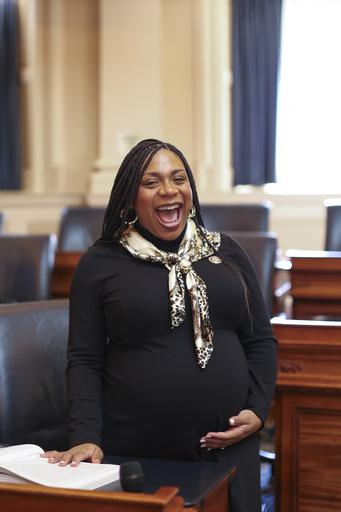
RICHMOND, Va. — Delegate Destiny LeVere Bolling has made history by becoming the first woman in Virginia permitted to vote remotely due to childbirth, casting her votes from afar after welcoming her child last week. This milestone took place in a statehouse that has predominantly been led by men for centuries.
Currently, women constitute about one-third of the state legislators, holding 49 out of 140 seats. Among these female representatives, around two dozen have children under the age of 18, with ages ranging from infants to teenagers. As LeVere Bolling managed her responsibilities at committee meetings, she unexpectedly went into labor. Clerk G. Paul Nardo has confirmed that she is the first lawmaker officially allowed to vote remotely due to the circumstances surrounding her recent childbirth.
Before giving birth, LeVere Bolling expressed the pressures women face to be continually present. “Being a woman, you feel pressured to just always show up,” she stated. “I feel compelled because of the issues — I feel compelled because of the lives that we’re all leading and the tumultuous political climate that we’re living in to be here. I almost feel this guilt or shame for being pregnant during this time, and I shouldn’t, right?”
The practice of remote voting was introduced in the Virginia House of Delegates as a response to the COVID-19 pandemic, which also saw the institution holding virtual sessions. Although the Senate opted for in-person meetings with online participation permitted, the rules this year allow Democratic House Speaker Don Scott the authority to permit a member to participate electronically for safety reasons. In Scott’s view, allowing LeVere Bolling to vote remotely was an obvious decision.
“We want to live our values,” Scott remarked. “We say we believe in families. We say we want people to participate when they’re young when they have something to think about. We don’t need all the legislators to be very old and people who have grown children.”
Virginia’s history with female representation in politics is relatively recent, dating back to 1924 when women first began serving in the legislature. In examining the state’s legislative history, a database indicates that over 9,500 men have served alongside only 123 women. Remarkably, Virginia now ranks among the states with the highest representation of mothers of young children within its state government.
In conjunction with Virginia’s progressive steps, the Colorado House also permits remote voting for health-related issues. Conversely, a report from the National Conference of State Legislatures reveals that 31 states do not accommodate remote participation in either legislative chamber’s floor proceedings as of 2023. Many experts believe that existing procedural rules do not adequately consider the needs of mothers.
“Proxy voting in Virginia would be a significant step towards modernizing our legislatures,” remarked Liuba Grechen Shirley, founder of the Vote Mama Foundation. “However, we need to do more to ensure lawmakers with caregiving responsibilities are fully included in the legislative process.”
Delegate Adele McClure, who recently had a daughter, is navigating the challenges of motherhood while managing her legislative duties, even pumping breast milk on the House floor. “I’ve had to kind of learn different ways to adapt and adjust to motherhood and postpartum life and healing,” she shared, noting, “I’m definitely not the same person I was last session.”
Delegate Elizabeth Bennett-Parker recounted her experience of bringing her 8-month-old baby to the Legislature last year, highlighting the difficulties this posed. She expressed optimism that proxy voting could become a normalized option, referencing ongoing discussions in Congress about remote voting for U.S. lawmakers.
“Every single year, we have members who have medical conditions, or every single year, I’ve seen paramedics called to the House floor for a member,” she pointed out, emphasizing the unpredictability of health issues.
On a recent Thursday in the House chamber, lawmakers engaged in lively debate regarding a tax-related Senate bill that had previously been in conflict with the governor. Amidst the discussions, the clerk called out for LeVere Bolling’s vote, which echoed through the chamber, affirming her participation: “Aye,” she responded, leading to the bill’s approval with a final tally of 62-33.

